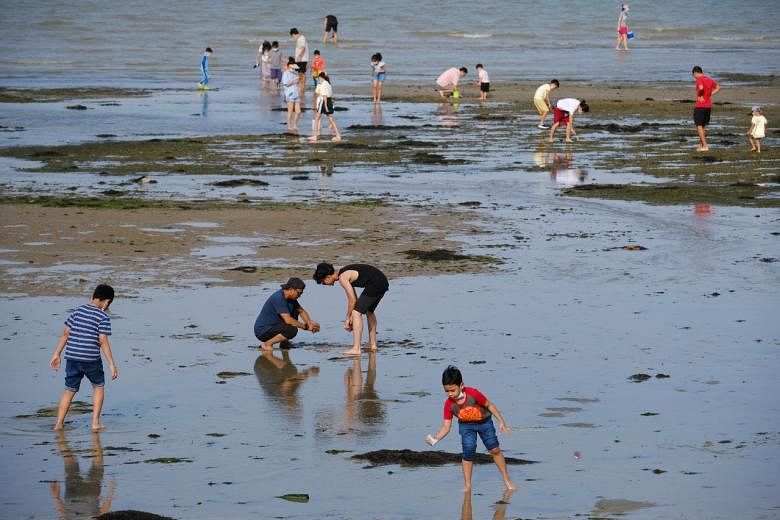SINGAPORE - More National Parks Board (NParks) officers and volunteers have been deployed at Changi Beach and other intertidal zones since last year, amid an increase in the number of visitors to beaches, especially during the holidays.
They remind visitors to refrain from touching, trampling and collecting specimens, as part of efforts to raise public awareness on protecting marine wildlife, said Minister for National Development Desmond Lee on Monday (Feb 28).
He was responding in Parliament to questions from Workers' Party MP Leon Perera (Aljunied GRC) and Mr Yip Hon Weng (Yio Chu Kang), who asked if measures are being taken to reduce the negative impact on intertidal habitats, such as Changi Beach, in view of higher visitorship.
Intertidal habitats refer to the ecosystems found on marine shorelines, which are subject to high and low tides.
The behaviour of visitors came under the spotlight following a recent spate of cases of beachgoers manhandling and collecting sea creatures at low tide.
Most visitors are cooperative and return the marine wildlife when advised by volunteers to do so, said Mr Lee, adding that the majority of the beachgoers are families exploring the area during public or school holidays.
More signs have been put up around the intertidal areas to educate visitors on how to interact responsibly with marine wildlife, and NParks will continue to step up these efforts, he added.
The Ministry of National Development is also discussing - with partners such as the marine conservation community, volunteers, businesses and the local community - how to manage the number of visitors at intertidal areas in a way that supports nature conservation while keeping these spaces open for public recreation, Mr Lee said.
Last weekend, it held a workshop to explore ways to educate visitors on Singapore's marine biodiversity, and better manage intertidal sites.
To assess the health of these ecosystems, NParks also conducts long-term habitat monitoring in collaboration with academics and volunteers, Mr Lee added.
"Recent data indicates that our marine biodiversity is generally in good condition, with little change in the composition of the marine ecosystem within key habitats since 2016."
The Government is assessing the possibility of strengthening protection for marine organisms under the Wildlife Act.
Currently, other than certain rare species such as giant clams, invertebrates - marine and land creatures without backbones, including shellfish and crabs - are not protected under the Act.
The Act, which came into effect in 2020, is meant to extend greater protection to Singapore's native wildlife, including threatened marine species such as sea turtles and stony corals.
For example, individuals who are found guilty of trapping or selling protected wildlife species without approval may be subject to a fine of up to $50,000, two years' jail, or both.
Mr Lee noted that over the past five years, there have been no cases prosecuted for the poaching of marine wildlife under the Wildlife Act or its predecessor, the Wild Animals and Birds Act.
He added that the Government will continue to review its measures to safeguard marine species and take enforcement action where necessary.
"We are committed to protecting the biodiversity of our coastal and marine ecosystems, including our intertidal areas," said Mr Lee.
"As we transform into a City in Nature, all of us have a part to play in protecting and caring for our rich biodiversity, so that our future generations can continue to enjoy our natural heritage."


